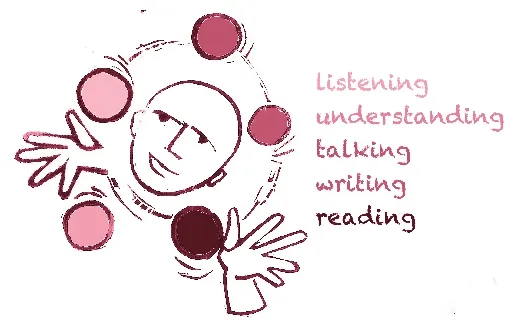科学提升学力的“13条军规”
2017-07-31BySprouts
⊙ By Sprouts
科学提升学力的“13条军规”
⊙ By Sprouts
Catch 13: How to Improve Your English—Scientifically

英式发音 适合泛听
语速:135词/分钟

Our brain can potentially memorize 2.5 petabytes[千兆]of information, which is roughly the equivalent of three million hours of YouTube videos. In order to use some of that staggering[惊人的]capacity[容纳能力]a little more effectively when you learn, here are some tips that are based on widely-accepted research by neuroscientists[神经系统学家]and learning experts.
Spaced Repetition 间歇重复
To maximize[最大化]your learning, study short but often. Neuroscientists proved that synapses[神经元突触]—the million billion connectors in your brain make you remember and understand stuff—grew mainly at night, when you were asleep. This means that it is more productive[有成效的]to study regularly with sleeping breaks in-between. Try it. Practise something for 15 minutes every day, and you’ll be surprised by your progress within just weeks.
Find Your Own Style 找到自己的风格
While listening to the history teacher, Chong scribbles[涂鸦]images, and Jane finishes one kilo of nuts. Some enjoy watching videos over reading books, others study with friends, and some like sitting in silence among a million books. Everybody is different.
Good Night Sleep 睡个好觉
Sleep and dreams are vital to processing and storing new information. A Harvard study showed that students who had a good night sleep remembered their study materials 35% better than those who studied in the morning to take a test in the evening.
Focus 集中精神
If you tend to procrastinate[拖延], which means that you tend to switch from doing something hard like studying maths to something easy like browsing[浏览]the web, protect yourself from distraction[分心的东西]. One way of doing this is to shut down your mobile phone or go to a quiet place, like a library.
Pomodoro Technique 番茄工作法
Set a timer to 25 minutes when you focus entirely on your studies. When the timer rings, relax[放松]for five minutes. If you want to continue, just set the timer again. The small breaks in-between are relaxing and motivating[激发积极性]to keep going.
Hard Stuff First 先难后易
Do the things that are difficult first, because, if you are like most people, you have the strongest willpower[意志力]in the morning. Once you are done with the hard stuff, you will feel better for the rest of the day, and probably more motivated to get other things done.

Exercise, Meditate and Converse 运动、冥想与交谈
There are few activities proven to grow your brain, however, physical exercise, regular meditation and good conversations apparently do exactly that. They lead to the creation of new neurons[神经元]inside your brain, and therefore grow its potential.
Go Places 到不同的地方去
You can create deeper memories of a subject by learning in a richer environment that offers more visual clues. In an experiment, two groups of students had to remember random words. One group changed the classroom while studying, the other didn’t. The group that studied in two different rooms—one was small and windowless, the other big and bright—was 40% more likely to recall[记起]the words later.
Take Fun Seriously 论乐趣的重要性
Whatever it is, find a fun way to practise. Modern learning science believes that positive emotions are very important for increasing your learning potential. So, do yourself a favour, and have a good time.
注:番茄工作法是一种简单易行的时间管理方法,由意大利人弗朗西斯科·西里洛(Francesco Cirillo)于1992年创立,数年内便在全球普及开来。
Space Your Studies 间隔再学习
In order to remember things for a longer time, repeat the material in spaced intervals[间隔]. Facts or vocabularies, for example, are best learned if you review them the first time one to two days after the initial study, and then again after one week, and after one month.
30 % Read, 70% Recite 三分读,七分背
If you have one hour to learn to recite a poem or prepare for a speech, spend 20 minutes of the time on studying the text and 40 minutes on practising to recite. This ratio[比例]usually leads to the best results. In the case of an emergency, put a glass of water next to you—take a sip[抿一小口]whenever you “lose it.”
Instant Self-Test 当场自测
After you study, finish up with a quick quiz. Immediate recall in the form of a test or a short summary on what you’ve just learned can increase retention[记忆力]by as much as 30% Because it’s much harder for your brain to reflect than to read, that extra effort creates deeper traces in your memory.
Don’t Force It 不要勉强自己
Motivation is like hunger. You cannot force yourself to be motivated, just like you can’t tell someone else to be hungry. So, if you are not hungry right now, don’t worry. Take a break, and do something else.

